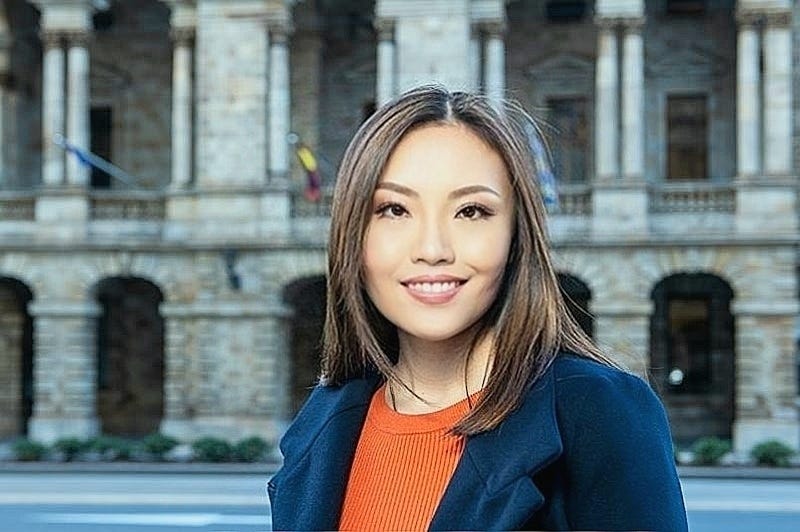INTERVIEW: Wincing First-Hand Account of Uyghur Concentration Camp Torture
This isn’t easy to read.
Omar Bekali visited Adelaide recently to deliver a series of keynote speeches.
At first glance, a man on a speaking tour seems ordinary enough. However, Omar’s story is anything but ordinary.
A survivor of the Chinese Communist Party’s Xinjiang Camp, Omar Bekali, 46, presents as a courageous but scarred man with first-hand experience of the Chinese Government’s network of concentration camps. He not only saw people being subjected to unspeakable brutality and torture. He was one of them!
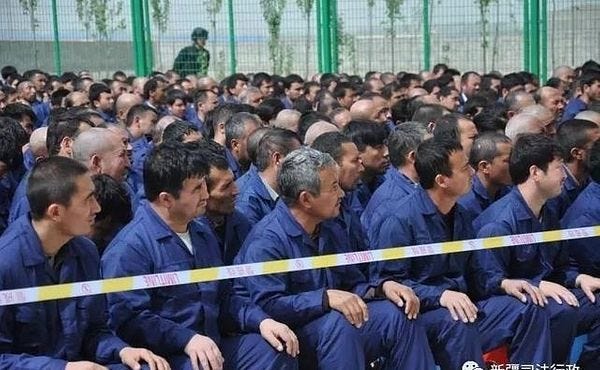
The following interview is compelling and especially wincing, coming with a reader warning. Yet his message is of global importance. The dark truth of China’s concentration camps and human rights violations is uncovered in all their gore.
The scene is Chinese occupied East Turkistan, Xinjiang.
The interview begins …
Liberty Itch: How did you end up in a concentration camp in XinJiang?
OB: My family and I lived in Kazakhstan. I went to Urumqi for a Trade Expo on 22 March 2017 for my work. Then on 25 March 2017, I went to Turpan, a City in Xinjiang, to visit my parents, where I was arrested and detained.
That morning, I was at my parents’ house with my brothers and sisters. Suddenly two police cars pulled up outside our house. Five armed police officers got out from their cars, came into our home, and arrested me. They never presented me with a warrant; they told me that they had one on their computer. I was brought to Dighar Village Police Station where I was made to wait for two hours. Every chance I got, I’d ask to call my parents, a lawyer, the Kazakh Embassy, or my wife, because no one knew where I was and I couldn’t call for help.
LI: On what grounds were you arrested by the Chinese Police?
OB: It is because I am a Turkic Kazakh. Beijing wants to erase all Turkic people in East Turkistan, a country invaded by the Chinese Communist Party in 1949. The land is now commonly known as ‘XinJiang, China’. I was suddenly accused of ‘terrorism’ and ‘smuggling people out of China’. I was targeted and discriminated against for being a Turkic Kazakh.
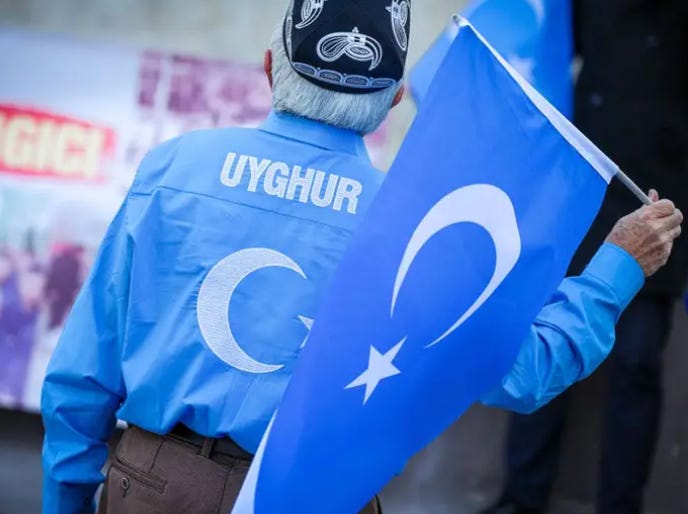
LI: When and how long did you stay in the camp?
OB: I stayed in the camp from 26 March 2017 to 24 November 2017.
LI: Where was your family at that time?
OB: My family was in Kazakhstan. I have a beautiful family with my wife and 3 children.
LI: How was your family impacted?
OB: The CCP destroyed my beautiful family. My family members including my children are all mentally impacted. My youngest son, who was one year and three month old when I was captured, could not call me dad for nearly a year after I returned. He complains even now that I abandoned him.
The purpose of these concentration camps is to indoctrinate Uyghurs into obeying the Chinese government. They use sophisticated mechanisms to brainwash us. I was told by the guards I had been poisoned by extreme ideologies during my life outside of China and needed to have a proper ‘Chinese Education’.
LI: What activities did they require of you in the camp?
OB: We are forced to study the Chinese language, Marxism, ‘Xi Jinping Thoughts’, renounce our religion and younger inmates worked in factories.
We were denied food for not agreeing to sing anthems that praised the Chinese government, otherwise known as Red Songs. We were told to denounce our Uyghur identity and Muslim faith. I was made to read a list of 60 types of common crimes associated with my ethnic and religious identity, praying to Allah, having a beard, attending a Muslim marriage, and communicating with people outside China.
My personal belief is that they never actually planned on indoctrinating us. The plan was always to exterminate the Uyghur population and harvest our organs.
LI: Did you comply with all the tasks? What would happen if you didn’t do them?
OB: I tried to resist. I denied the Chinese government’s accusations and asked them to show me the evidence. But that led to severe torture as punishment. The police realised they needed to escalate the pressure to get me to say what they wanted me to say.
From the police station I was brought somewhere I didn’t recognise. The police made me take off my clothes and examined my body, making notes about my condition. That’s when the torture started. They transferred me to the police station, in Kelamayi, Xinjiang.
My hands were strapped onto the arms on the chair
and my feet were constrained at the bottom
while needles were gradually slid into my fingers.
That would last four to eight hours every day.
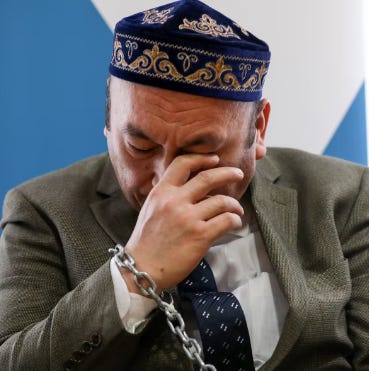
From April 3 to April 7, 2017, they would put me in the ‘Tiger Chair’ to try and extract information from me and compel me to admit to crimes I wasn’t guilty of.
They said I organised terrorist activities, propagated terrorism, or covered-up for terrorists. The police showed me photos of Uyghur and Kazakh people in Kazakhstan and asked me for their information.
I was given a letter accounting for all of my ‘crimes’ and told to sign it as a confession.
My job was used against me. The police claimed I was using my tourism career as a way to smuggle people out of China and into neighbouring countries.
Needles and nails were inserted into my body every time I told them “no” or “I’m innocent”.
An iron wire was shoved into my penis.
Rope was tied to the ceiling and around my wrists so tight that my feet couldn’t touch the ground. The rope ripped through the skin on my wrists while my body weight pulled me down.
Other days I was put in a “flying plane” position, where both my wrists and feet were tied to the ceiling, pulling my arms and legs out of their sockets while I was left dangling.
The guards would laugh as my body pulled itself apart.
There were five other types of punishment for those who didn’t follow the guards’ orders.
- First, they’d make me face a wall for 24 hours without food or drink while they beat me with rubber rods.
- Second, we were put in the Tiger Chair where needles were shoved into our fingers and feet.
- Third, we’d be left in solitary confinement with no light for 24 hours.
- Fourth, they’d put us into scorching hot rooms in the summer or freezing cold rooms in the winter.
- Finally, a punishment I thankfully never experienced was called water prison. I heard of many detainees who were put in the water prison, but I don’t know what it is.
LI: How did you manage to escape?
OB: To my great surprise on November 24, 2017, I was informed of my release and expulsion to Kazakhstan. I had been detained for eight months. I later learned that my wife sent a number of letters to the UN Human Rights Commission and the Kazakhstan Foreign Minister attesting to my innocence.
The considerable press coverage of my illegal detainment was a major factor in my release.
LI: Where do you live now?
OB: I migrated to the Netherlands with a valid visa. I moved there to provide eyewitness evidence about what is happening in the concentration camps in XinJiang.
LI: How many Uyghur people are in concentration camps in XiaJiang?
OB: It’s always hard to tell, of course. However, while I was in the camp in 2017, my best estimate is that more than a million Uyghurs were in the camps.
Omar’s is a cautionary tale about brutality inflicted by our largest trading partner. He endured trauma and unspeakable pain that no-one should be required to bear.
However, I prefer to see Omar through the lens of unfaltering courage, resilience and the strength to survive. There’s a bravery in telling his painful story again and again on a global stage, a story shared by millions of Uyghurs and other minority groups who are still in the XinJiang camps.
Today, he is bringing his testimony before international human rights bodies.
What can everyday Australians do to help the Uyghur people?
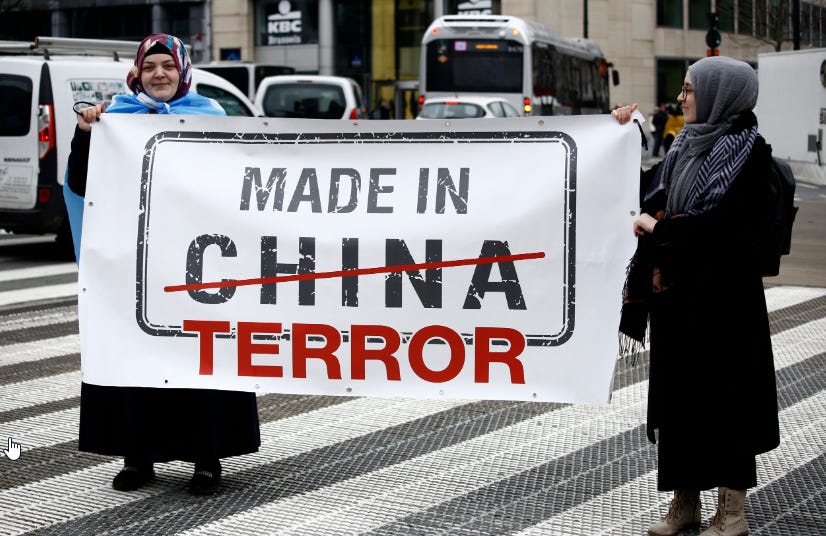
This year the United States used it’s Magnitsky legislation to ban the import of certain Xinjiang products, including cotton, over concerns about forced-labor in the XinJiang region.
Australia has similar Magnitsky legislation but has not used it to sanction companies exploiting Uyghur slave-labour.
Whilst we at Liberty Itch wholeheartedly support free-trade and are against wholesale nationwide sanctions, products manufactured with slave-labour is anathema to free-trade principles and cannot be supported.
While you wait for your Commonwealth Government to take a stand on this, you can take action as an individual and purchase alternatives to brands made with Uyghur slave-labour.
Small acts of defiance in support of human rights go a long way.

